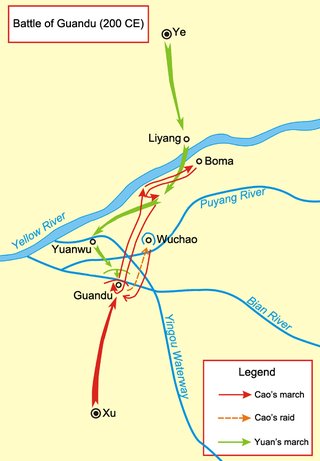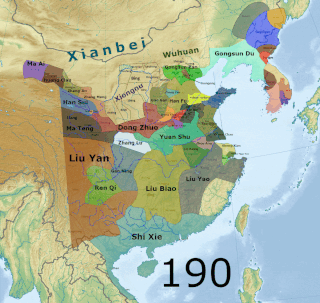Related Research Articles

The Battle of Guandu was fought between the warlords Cao Cao and Yuan Shao in 200 AD in the late Eastern Han dynasty. Cao Cao's decisive victory against Yuan Shao's numerically superior forces marked the turning point in their war. The victory was also the point at which Cao Cao became the dominant power in northern China, leading to the establishment of the state of Cao Wei in the Three Kingdoms period.

Yuan Shao, courtesy name Benchu (本初), was a Chinese military general, politician, and warlord who lived in the late Eastern Han dynasty. He occupied the northern territories of China during the civil wars that occurred towards the end of the Han dynasty. He was also an elder half-brother of Yuan Shu, a warlord who controlled the Huai River region, though the two were not on good terms with each other.

Guo Jia, courtesy name Fengxiao, was an adviser to the warlord Cao Cao during the late Eastern Han dynasty of China. Throughout his 11 years of service, Guo Jia aided Cao Cao greatly with his brilliance and foresight, and his strategies were instrumental to Cao Cao's triumphs over rival warlords such as Lü Bu and Yuan Shao. For example, four years before Cao Cao's decisive victory over Yuan Shao at the Battle of Guandu, Guo Jia already foresaw that Cao Cao would win when he pointed out ten advantages Cao Cao had over Yuan Shao.

The military history of the Three Kingdoms period encompasses roughly a century's worth of prolonged warfare and disorder in Chinese history. After the assassination of General-in-chief He Jin in September 189, the administrative structures of the Han government became increasingly irrelevant. By the time of death of Cao Cao, the most successful warlord of North China, in 220, the Han empire was divided between the three rival states of Cao Wei, Shu Han and Eastern Wu. Due to the ensuing turmoil, the competing powers of the Three Kingdoms era found no shortage of willing recruits for their armies, although press-ganging as well as forcible enlistment of prisoners from defeated armies still occurred. Following four centuries of rule under the Han dynasty, the Three Kingdoms brought about a new era of conflict in China that shifted institutions in favor of a more permanent and selective system of military recruitment. This ultimately included the creation of a hereditary military class as well as increasing reliance on non-Chinese cavalry forces and the end of universal conscription.
Yuan Tan, courtesy name Xiansi, was a Chinese military general, politician, and warlord who was the eldest son of Yuan Shao, a warlord who occupied much of northern China during the late Eastern Han dynasty. After Yuan Shao's death, Yuan Tan engaged his younger brother, Yuan Shang, in a power struggle over their father's territories. He sought help from his father's rival, Cao Cao, and defeated Yuan Shang with Cao's help. However, the alliance between Yuan Tan and Cao Cao was eventually broken and Yuan was defeated and killed in the Battle of Nanpi by Cao Cao's troops.
Yuan Xi, courtesy name Xianyi or Xianyong, was a Chinese military general and politician. He was the second son of Yuan Shao, a warlord who controlled much of northern China during the late Eastern Han dynasty. He was executed along with his brother Yuan Shang by Gongsun Kang.

The Wuhuan were a Proto-Mongolic nomadic people who inhabited northern China, in what is now the provinces of Hebei, Liaoning, Shanxi, the municipality of Beijing and the autonomous region of Inner Mongolia.

The end of the Han dynasty was the period of Chinese history from 189 to 220 CE, roughly coinciding with the tumultuous reign of the Han dynasty's last ruler, Emperor Xian. During this period, the country was thrown into turmoil by the Yellow Turban Rebellion (184–205). Meanwhile, the Han Empire's institutions were destroyed by the warlord Dong Zhuo and fractured into regional regimes ruled by various warlords, some of whom were nobles and officials of the Han imperial court. One of those warlords, Cao Cao, was gradually reunifying the empire, ostensibly under Emperor Xian's rule; the Emperor and his court were actually controlled by Cao Cao himself, who was opposed by other warlords.
Guo Tu, courtesy name Gongze, was an official and adviser serving under the warlords Yuan Shao and Yuan Tan during the late Eastern Han dynasty of China.
Zhang Yan, born Chu Yan, also known as Zhang Feiyan, was the leader of the Heishan bandits during the late Eastern Han dynasty of China. He rose from a local rebel to master of a confederation that could hold off the Han and was able to maintain authority in Changshan until he chose to surrender to Cao Cao, getting enfeoffment that remained with his family.
Tadun was a leader of the Wuhuan tribes during the late Eastern Han dynasty of China. He was an ally of the warlord Yuan Shao and Yuan Shao's son and successor Yuan Shang.
Tian Kai was an official serving under the warlord Gongsun Zan during the late Eastern Han dynasty of China.
Yan Rou was a military general of the state of Cao Wei during the Three Kingdoms period of China. He previously served under the warlord Cao Cao in the late Eastern Han dynasty.
Xin Ping, courtesy name Zhongzhi, was a Chinese official who served under the warlords Han Fu, Yuan Shao and Yuan Tan during the late Eastern Han dynasty.
The Battle of White Wolf Mountain was a battle fought in 207 in the late Eastern Han dynasty of China, preceding the Three Kingdoms period. The battle took place in northern China, beyond the frontiers of the ruling Eastern Han dynasty. It was fought between the warlord Cao Cao and the nomadic Wuhuan tribes, who were allied with Cao Cao's rivals Yuan Shang and Yuan Xi. The victory attained by Cao Cao dashed the hopes of a Wuhuan dominion, and the Wuhuan eventually became weakened, lost importance, and were gradually absorbed into the Han population or the Xianbei tribes.
The Battle of Liyang, fought between October 202 and June 203 in the late Eastern Han Dynasty, was an invasion attempt by the warlord Cao Cao against the brothers Yuan Shang and Yuan Tan, the sons of Cao's rival Yuan Shao. The battle in October 202 was the first between the two factions since the death of Yuan Shao four months earlier. Although it ended in Cao Cao's withdrawal, events in this battle brought tensions between the Yuan brothers to the surface as Yuan Tan mutinied against his younger brother Yuan Shang after Cao Cao's temporary exit from the scene.
The Battle of Ye or Battle of Yecheng took place in 204 in the late Eastern Han dynasty. It was fought between the warlord Cao Cao and Yuan Shang, son and successor of Cao Cao's rival Yuan Shao, in the Yuan clan's headquarters Ye. Cao Cao had been allied with Yuan Shang's elder brother Yuan Tan, who rebelled in a succession feud, and it was by Yuan Tan's request that Cao Cao laid siege to Ye. The successful siege of the city dislodged Yuan Shang's power from Ji Province, and Cao Cao would later use the city of Ye as a major base of his military power.
The Battle of Nanpi happened in the first month of 205, during the period known as the end of the Han Dynasty. The battle spelled the annihilation of Yuan Tan, one of Yuan Shao's sons vying to succeed their father, by their common enemy Cao Cao, one of the serving Three Ducal Ministers. Having already dealt a major blow to another son Yuan Shang, Cao Cao's victory at Nanpi gave him uncontested control of the North China Plain, while the remnant Yuan power blocs were chased further north.
Lady Liu (劉夫人) was a Chinese noblewoman who lived during the Han Dynasty. She was a concubine of Yuan Shao, the Grand Administrator of Bohai. She was also the mother of Yuan Shang, third son and successor of Yuan Shao. After Yuan Shao's death, she succeeded him as the de facto leader. She is best known for starting a conspiracy against members of the Yuan family and plotting the murder of Yuan Shao's five concubines so that her son would become the family's sole heir.
Shi Huan, courtesy name Gongliu, gained a reputation for valour and loyalty comparable to Han Hao. Shi Huan served the Eastern Han dynasty warlord Cao Cao from early on and was a trusted figure who helped supervise officials.
References
- 1 2 de Crespigny (2007), p. 1009.
- ↑ 11th month of the 12th year of the Jian'an era, per Emperor Xian's biography in Book of the Later Han. The month corresponds to 7 Dec 207 to 5 Jan 208 in the Julian calendar.
- ↑ Sanguozhi vol. 6.
- ↑ Sanguozhi vol. 6.
- ↑ Sanguozhi vol. 6.
- ↑ Sanguozhi vol. 14.
- ↑ Sanguozhi vol. 6.
- ↑ Sanguozhi vol. 6.
- Chen, Shou (3rd century). Records of the Three Kingdoms (Sanguozhi).
- de Crespigny, Rafe (2007). A Biographical Dictionary of Later Han to the Three Kingdoms 23-220 AD. Leiden: Brill. ISBN 9789004156050.
- Fan, Ye (5th century). Book of the Later Han (Houhanshu).
- Pei, Songzhi (5th century). Annotations to Records of the Three Kingdoms (Sanguozhi zhu).
- Sima, Guang (1084). Zizhi Tongjian .